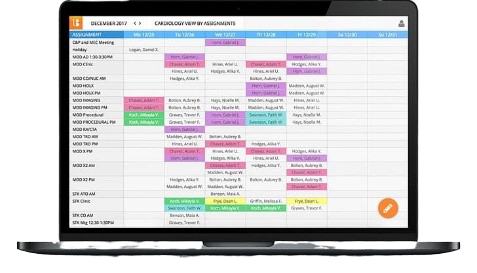Surviving Online Instruction
TRIO understands that for some of you online classes are foreign territory. Below are a few tips that may help you to navigate these new waters and still produce quality work you can be proud of. On top of meeting with your TRIO advisor and seeking tutoring these time management tips and study habits may be the perfect combination for success!
10 Tips On How To Be A Successful Online Student
- Accept the fact that at first you will feel overwhelmed with online courses
The fact is, the first time you try anything new, it feels overwhelming. Online courses are no different. It takes time to learn how to maneuver through the system and to communicate with others online. Your confidence will build as you become more comfortable with how things work. Think about ways to motivate yourself now, so when you feel overwhelmed, you keep yourself grounded in your overall educational goals and keep moving forward. - Take full advantage of available resources
There are a variety of online and on-site resources available to students. Online tutoring provided by Tutor.com as well as EIU TRIO SSS Virtual Tutoring, 24/7 access to online library resources, free Microsoft Office 365 products (Word, Excel, PowerPoint), OneDrive account for file storage and sharing, Microsoft Office Teams and Zoom for web-conferencing. Familiarize yourself with available resources to use them for increased learning experience and success in your online courses. - Log on to your courses and check your campus email account frequently
Make sure to check your courses a minimum of 4-5 days a week. Once you get into the online chat discussions, you will want to see who has commented on your postings and read the professor's feedback. If you let too many days go by, you will get behind and find it very difficult to catch up. Your professors may utilize D2L or some other platform. - Actively communicate and participate in your online courses
Regular participation is critical to a quality online experience for everyone. Your classmates have a wide variety of background experiences that will naturally come out during discussions and projects, and it is a great way to network with future colleagues. Jump in and contribute! In general, frequent, substantive participation in discussions is a requirement in online classes. Based on conversations with students that are taking online courses, they all state that interactions are essential to the success of an online student. Active communication can demonstrate to the professor that you comprehend and are using what you learn in class. Be sure to email your professor if you have questions. - Budget your time, set schedules, and complete work on time utilizing a paper or online academic planner
Make sure you block off regular time to work on your courses and stick to that schedule. For new online students it often takes a few weeks to get into a pattern, but you will find that setting a specific time-period to work on your class will keep you on track. With your work schedule and other commitments, you may actually wind up having less time on hand to finish your coursework. You will need to carve out the time from your busy schedule to watch lectures, participate in discussions online, and complete assignments on your own. How can you manage to stay committed? Devising a study schedule, developing good relationships with your instructor and fellow students, and loads of sheer determination can help you stay on track with your commitment to earn passing grades. - Make sure you have a private space where you can study
Online courses are a convenient way to attend a class that you might otherwise not be able to participate in on-campus. Keep in mind the importance of having a private place to concentrate and work on your courses. Being on campus for a face-to-face course is a great way to get away from the disruptions of work or family for a few hours, and you will need to find a similar space to do the same when you work on your online courses. - Speak up if you are having problems
Technical difficulties are not an excuse for late or missed assignments. If you are having technical difficulties, or problems understanding something about the course, you MUST speak up; otherwise, there is no way that anyone will know that something is wrong.
- Determine how you learn best There are at least four types of learners:
- visual (by sight)
- auditory (by hearing)
- reading/writing
- kinaesthetic (by doing)
Determine how you learn best and then tailor your studies to that style. If you are a visual learner, for example, print out transcripts of the video lectures to review. Are you good at listening and learning? Make sure to build time into your schedule to play and replay audio- and video-based course content. To improve as a hands-on learner, try taking notes as you study or watch lectures. Go through these notes and memorize critical points while walking or exercising; this can help to reinforce learning.
- Retain what you learn and stay motivated
Now that you are becoming an online learner, you will need to focus on ways to retain this knowledge. Discuss what you have learned with others, and your retention will go up. Use the information actively, and it goes up even more. Retention goes up as high as 90% when you teach the concept or immediately put it into practice (according to a study by Psychotactics). Celebrate small wins to stay motivated to learn online. Take a break now and then, exercise, stay hydrated with water or post progress on social media with your immediate circle. Consider 50 minutes of work and then a 5-10 minute break.
- Become a pro at using online tools to help you succeed
Becoming familiar with online resource tools are critical to your online education. There are a variety of platforms that can assist you in numerous ways. There is even a program to help you if you have labs. Mobile devices can be useful; however, using your phones may not give you the total access you need to complete some assignments. Find out which online resource tools will best suit your educational needs. Most are free and can operate on a mobile device or computer.
Technical Skills Required To Learn Online Courses
- Comfortably be able to use a computer
- Perform basic navigation - minimize and maximize Windows; use the forward and back browser functions
- Create, save, scan, print, and manage computer files
- Copy and paste information using the clipboard
- Understand a browser is used to surf the internet, such as Google Chrome, Microsoft Explorer, Safari or Mozilla Firefox
- Upload documents by browsing your computer files
- Understand and use CTRL+C = (copy), CTRL+V = (paste) and CTRL+P = (print) short-cut keys to save time
- Comfortably be able to use the internet, as well as, research internet information
- Understand Google searches and know material used in college must not be plagiarized
- Send and receive email messages and include attachments to email
- Have a computer with internet access to login to classes
Contact the appropriate person/department such, as your professor if content is not accessible or the EIU IT Help Desk (217-581-4357), or Panther Tech https://www.eiu.edu/panthertech/ if you are having technical issues with online courses.
